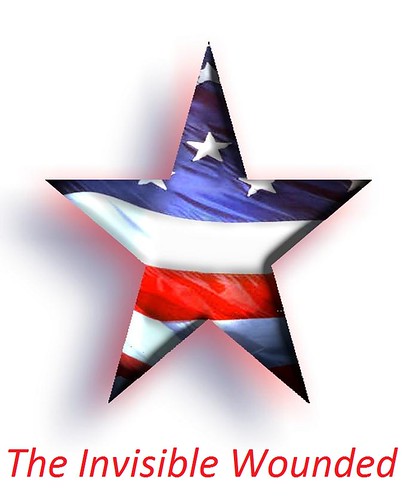I am the wife and a full time caregiver of a severely injured soldier. This journey began 21 November 2007, the day before Thanksgiving. We have been living with the effects of this day ever since. We have had many blessings and struggles along the way and continue to do so every day. I am committed to my marriage, my children, and my role as a caregiver and advocate. However, this is not an easy road to travel and I need your help.
My husband did suffer physical injuries initially, but now is left with the invisible ones, PTSD and TBI. His PTSD includes dissociative episodes, depression, migraines, anxiety, and nightmares just to name a few. Of course, this is all complicated by his TBI. This all affects our entire family in every way. We are struggling here, just to have safety and peace within our own home.
Living with someone with PTSD on this level is lonely and frightening. There are not many that have it to this extent or level. I have had numerous professionals tell me that his is the worst they have seen. I can't decide if they tell me this to comfort me or to sympathize with me. We have several people in paid positions who are supposed to be advocating for the care he needs. Often times, they too do not have any answers for us. Therefore I am left to search for some answers, which has led me to reach out to you.
Currently, my husband Allen is in a residential treatment program in Yountville, California called The Pathway Home. It is a program that I found on my own, after several months of searching, and that is really a last resort for us. If this program is unable to get my husband to a safe place with his PTSD, we will have to search for a place he can reside long term. That is a worst case scenario for us but one we may very well have to face. It just may not be safe for him to live at home with us any longer. He has severe dissociative episodes where he has a complete break from reality. These episodes put him in full combat mode and everything he sees is in his head. While in this mode, he is a soldier defending himself and his guys. He may be in a fire fight or hand to hand combat. Anything becomes a weapon, and we never know if we are on his side or if we are the enemy. These episodes are very frightening for all of us and our boys, ages 14 and 7, have witnessed them numerous times as well.
I know that we are not the only family facing these challenges. Families like mine are fighting everyday to get care, treatment, and benefits for their hero and their family. Often times we end up being labeled a "benefit seeker" and therefore get fewer benefits than we genuinely deserve and need. With a spouse suffering like mine, I am unable to work and help provide for our family, so we are counting on those benefits our family has already sacrificed so much for. It just shouldn't be this hard. We shouldn't still have to fight the war once our spouses come home. But, the reality is, we do. My husband's VA claim was submitted 15 months ago, and we are still waiting for a rating. That means that since May, when Allen was medically retired from the Army, we have been living on half of the income he was making on active duty. This is a financial disaster for us with no hopes of a recovery since we can look forward to living on a set income for the rest of our lives.
Another issue we are personally facing is housing. We own our home, but there are huge environmental triggers very close to us that contribute to my husband's dissociative episodes. A mile from our house is a rock quarry that blasts 1-4 times a day, depending on the weather. This shakes our house and is perceived by my husband as incoming. Right across the street, about 100 yards away, is a very busy railroad depot. Therefore they connect the trains right next to us and they boom together and once again, vibrate our house. Since we live in the city limits in the Midwest, we also deal with weekly tests of the tornado sirens. These are the same sirens they use in a combat zone to alert our troops of incoming. All of these things are constantly triggering Allen and sending him right back into combat. That leaves me and my children fighting to bring him back home. We have to shove him in the shower and get cold water on him to bring him back. We do not have a walk-in shower, so often this is a physical fight getting him there. He has also escalated to a much more resistant state during these episodes and has started becoming very physical with us as we try to get him back. Because we are still waiting for benefits, we cannot get our house on the market and try to purchase another one away from these triggers. The non-profits out there that are building mortgage free homes for wounded warriors do not consider the invisible wounded for their programs.
I applaud you, Mrs. Obama, for bringing awareness and attention to the whole military family, rather than just the service member. It is exciting to see things begin to change for families like mine. However, we still have such a long way to go and I pray that we will get there. Families that have already sacrificed so much should not be worrying about all of these issues I've shared with you today. We, as a nation, have to become engaged in taking care of our military families, especially the wounded ones. We need programs to help treat PTSD. We need financial assistance so that our families can have our basic needs met without worrying where our next meal will come from. We need safety nets in place that will prevent families from falling through the cracks, especially our National Guard and Reservists. We need the backlog within the military MEB and VA claims to be depleted. Our children need to have protection and security and know that we will be alright. The general public needs to become aware of these issues facing the ones who have fought for their freedom. There are so many little things they can do that would make our lives so much easier. We need your help in getting these needs met.
There is much more I could share with you. I could go on and on with example after example from my family alone. However, I hope I have gotten my message across with the small pieces I have shared with you. Given my personal experiences and my conversations with families like mine from all over the country I urge you to push forward with raising awareness about our wounded warriors and their families and to make some real change in the programs and benefits available to our heroes. I am committed to assist in any way I can beyond my own family by speaking, advocating, and continuing to share our story. Please, consider these things and let's find some relief, resources, and assistance for The Bravest Families in America.
Very Respectfully,
Gina Hill
Spouse & Caregiver of (Ret) SSgt. Allen C. Hill















